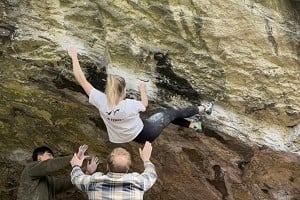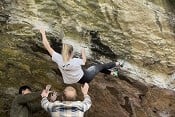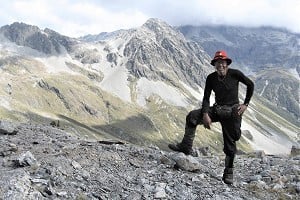

Alex Megos has flashed Underground (9a) in Arco, Italy. The route was first climbed by Manfred Stuffer in 1998 and was once considered the hardest route in Italy.
Read more
A fantastic effort from Alex! Alex has commented this morning on the grade on 8a.nu:
"I think that 9a seems a bit over the top. 8c+/9a is more appropriate but it could as well only be 8c+. It's always hard to say if you only tried once."
Would it be worth amending the grade to 8c+/9a in the report?
I don't know how many people have climbed Underground, but would imagine it is at least 10. If 9 say 9a and Alex says 8c+ does that really warrant a downgrade? He's clearly in exceptional form at the moment so maybe hes just stronger than he thinks?
(Just to add, I don't know if any previous ascensionists have suggested a downgrade...)
The original grade given was 8c+/9a.
There are some comments providing some context on Alex's instagram post which are worth a read
Look either it's 8c++ or 9a-
Perfectly fine for Alex to give a suggestion of grade but I think in this case Alex's opinion should be given less consideration than other ascensionists, onsighting a route compared to redpoint will never give you the same understanding of the true difficulty.
> onsighting a route compared to redpoint will never give you the same understanding of the true difficulty.
Especially considering routes at that level are always graded for redpoint.
> Perfectly fine for Alex to give a suggestion of grade but I think in this case Alex's opinion should be given less consideration than other ascensionists, onsighting a route compared to redpoint will never give you the same understanding of the true difficulty.
So you're saying redpointing is harder than onsighting?
> So you're saying redpointing is harder than onsighting?
Obviously not, he's saying that if routes are graded for redpointing then redpointing is going to give you a better comparative idea of the difficulty.
Interesting topic! If routes at that level are graded for red pointing, who decided this was the case and at what grade do routes start to be graded for onsighting?
> Interesting topic! If routes at that level are graded for red pointing, who decided this was the case and at what grade do routes start to be graded for onsighting?
Routes are graded for the easiest possible sequence. Whether you are redpointing or on-sighting does not make a difference for the grade. It can make a difference for the perception of the grade because on average you have a better chanche of finding the easiest possible sequence when redpointing.
In fairness, nearly every hard sport route put up is originally done on redpoint. And it's the FA that suggests the grade, at least initially.
> Routes are graded for the easiest possible sequence. Whether you are redpointing or on-sighting does not make a difference for the grade. It can make a difference for the perception of the grade because on average you have a better chanche of finding the easiest possible sequence when redpointing.
This is not true. Routes are graded by a consensus after an initial estimate from the first ascentionist. Therefore, routes which are usually redpointed end up being graded by people who have redpointed them and the grade is usually therefore based on relative difficulty to redpoint. On the other hand, routes which are usually onsighted end up being graded by people who have onsighted them and the grade is therefore biased more towards the relative difficulty of the route to onsight. None of this is rule or process based: it is just the outcome of climbers' concensus.
This ^
"..routes which are usually redpointed end up being graded by people who have redpointed them and the grade is usually therefore based on relative difficulty to redpoint. On the other hand, routes which are usually onsighted end up being graded by people who have onsighted them and the grade is therefore biased more towards the relative difficulty of the route to onsight."
I disagree. Routes are graded according to the easiest sequence for either an onsight or a redpoint. For all its flaws in relation to climbers' heights, reach etc., (and its the best measure we have) it is an 'absolute' concept.
If you are good enough to do a route onsight then kudos to you. You are either strong enough to hang around long enough to work out a sequence that works or talented enough to read it in time before your arms blow up (probably a combination of the two). Either way, you have earned the onsight of the route i.e. your ability to get up it first try, without prior inspection. The physical difficulty you experience is in all likelihood higher than that experienced by the redpointer as you don't know all the tricks. However, this is irrelevant - nobody is saying that the physical moves are the same for the redpointer and the onsighter - of course they are different as the onsighter will likely not read the route perfectly and climb most (if not all) of it without using the perfect sequence, which only the redpointer who has sunk many sessions into a line will know. That is why an onsight is so highly prized because your climbing level is sufficiently high that it allows you to overcome these factors to get up the route without any prior knowledge or attempts.
> "..routes which are usually redpointed end up being graded by people who have redpointed them and the grade is usually therefore based on relative difficulty to redpoint. On the other hand, routes which are usually onsighted end up being graded by people who have onsighted them and the grade is therefore biased more towards the relative difficulty of the route to onsight."
> I disagree. Routes are graded according to the easiest sequence for either an onsight or a redpoint. For all its flaws in relation to climbers' heights, reach etc., (and its the best measure we have) it is an 'absolute' concept.
It is not. Otherwise we would different grades for every body type, every style of ascent etc. That wouldn't be sensible.
> If you are good enough to do a route onsight then kudos to you. You are either strong enough to hang around long enough to work out a sequence that works or talented enough to read it in time before your arms blow up (probably a combination of the two). Either way, you have earned the onsight of the route i.e. your ability to get up it first try, without prior inspection. The physical difficulty you experience is in all likelihood higher than that experienced by the redpointer as you don't know all the tricks. However, this is irrelevant - nobody is saying that the physical moves are the same for the redpointer and the onsighter - of course they are different as the onsighter will likely not read the route perfectly and climb most (if not all) of it without using the perfect sequence, which only the redpointer who has sunk many sessions into a line will know.
Here you hit almost on the key point but don't quite. Of course any route is harder to onsight than to redpoint. But the difference is far greater for some routes than for others. If you take two routes of different styles it is quite feasible for route A to be easier than route B to onsight, but route B to be easier than route A to redpoint. Ultimately our grades are determined by concensus and so these comparisons within climbers' experience end up being reflected in the grade.
Tomas Mrazek on this route has been one of my fave climbing vids
> Perfectly fine for Alex to give a suggestion of grade but I think in this case Alex's opinion should be given less consideration than other ascensionists, onsighting a route compared to redpoint will never give you the same understanding of the true difficulty.
All of the discussion following this post seems rather academic since he didn't onsight the route but flashed it. Therefore it seems likely he used the easiest possible sequence since he already knew it in advance.
Agreed! We seem to have gone 'down a rabbit hole' as the yanks would say... Anyhoo, a rather interesting rabbit hole nonetheless. A thought occured to me, any route is simply a collection of holds on a wall. Whatever we climbers choose to label it whether by consensus, by one system or another, too high or too low, for an onsight, flash or redpoint makes no difference to the climb. Its difficulty via the easiest method will not be altered by any labels we choose to apply to it and cannot be changed - it is as 'fixed' as the holds are permanent features (at least for outdoor routes that don't break or crumble). That is why I referred to a climb's difficulty as an absolute concept and why I believe that any grade given is for the easiest method possible (usually found out by the redpointing). Onsighting/ flashing is simply a reflection of a climber's talent/ability in doing it first try.
Interesting discussion!
You're forgetting the climber. Yes the layout of the holds on the wall is fixed; the layout of the climber isn't.
Supposing a route has a heinous one move crux that a 6'6" climber with a +4" ape index can simply lank past. Assuming this lanky climber exists, then the "easiest" method is to be him (or less likely her). Otherwise you're back to assessing the difficulty of the easiest sequence for some hypothetical "average" climber.
True, the problem is insoluble. All we have is a 'best efforts' tag to each route according to climbers' experiences of it. There will always be outliers where a climber of over average height finds it easier than others. However, I am constantly surprised how different climbers come up with ingenious solutions to solve cruxes that are 'supposed' to be more difficult for them due to being short e.g. but which they manage to find another way through via different footholds/ intermediates that are unusable for taller climbers (e.g. on my current projects at Kilnsey!)
> Perfectly fine for Alex to give a suggestion of grade but I think in this case Alex's opinion should be given less consideration than other ascensionists, onsighting a route compared to redpoint will never give you the same understanding of the true difficulty.
I would have said the exact opposite, insofar as I can't think of may climbers more qualified to comment on the grade than Alex.
From his recent Facebook post, his ticklist from a mere 5 days of climbing included a whole lot of mileage in/around the 8c-9a grade, which would - at least in my eyes - give him a fair standing on what is/isn't 8c, 8c+ and 9a.
- Hades 9a (8c+?) 2nd try
- Fonax 8c+ (8c+/9a?) 5th try
- Lichtjahre 8c+ (8c+/9a?) 3rd try
- Athene 8c 2nd try
- Claudio Caffè 8c+ (8c?) 2nd try
- Underground 8c+/9a Flash
- Pure Dreaming 9a (8c+/9a? with kneepad) 2nd try
- Mike Jordan 8b+ 3rd try
That said, I do think there's something to be said about climbers in general (not necessarily Alex) not quite appreciating + taking into account when they've had a rise in performance, instead acknowledging everything getting easier; however, this is something he acknowledges within his own post: "I put my personal opinion of the grades in brackets. Those are of course just grade suggestions and very subjective".
Objective though we might like grades to be, they never are - really...
Not to mention that Alex's suggestion of 8c+/9a is slap bang in the middle of the consensus - the grades from ascents logged on 8a.nu are split roughly 50-50 between 8c+ and 9a.
So I honestly don't see why there's actually even anything to talk about? There might be if he were suggesting something outside the consensus range, or if this were the first ever flash of a maybe-9a. But neither of the above.
> I would have said the exact opposite, insofar as I can't think of may climbers more qualified to comment on the grade than Alex.
I think this is a common thought /idea among climbers but I dont agree and I find it kind of elitist. I dont care how many 8c's he has climbed this week that doesnt mean he is any better at judging difficulty. When i climb sport, 6b/6c sport is very easy for me i can onsight or get it second go all day long, however if I come along and onsight the 6b+ and it feels a bit soft for me but my mate who is projecting that route reckons it is solid 6b+ than i would defer to his judgement because he is going to know the route so much better than me, arguably he would also know that grade bracket better than me.
Anyone even attempting this route is obviously a rediculously experienced climber and knows how to judge difficulty just as well as Alex, if you are on a 9a you didnt just skip a load of grades and jump on, you have climbed a lot of hard routes.
when you flash something, your body could be firing and your strong or the opposite, you could find the best beta or completely miss it, conditions could be perfect or shit, only by climibng it a number of times will you get a good idea of this.
> Not to mention that Alex's suggestion of 8c+/9a is slap bang in the middle of the consensus - the grades from ascents logged on 8a.nu are split roughly 50-50 between 8c+ and 9a.
yes my point is not about Alex, i should have made it clearer in my original post that this i meant no criticism of Alex, he has done exactly what you should do, climb it and make a suggestion of what you think it is, thats great. My point is just about the difference between grading routes based on onsight or redpoint in general.
I think people grade more accurately at the level they climb at. For an 8a climber the difference between a Frankenjura 5+ or 6 is probably not even noticeable. IMO that may explain why grading feels much more consistent at higher grades. Extrapolating to other areas will still be tricky.
The grading problems in rock climbing pale, though, compared to mountaineering: Try to match guidebook times in Switzerland, or even worse, try to understand the difficulty rating of alpine climbs, where a slightly technically difficult semi bolted climb next to a cable car station can get the same TD+ grade as some ultra serious but technically "easy" North face mixed route....
CB
This is peak internet.
A guy flashes a route so hard that 99.9% of climbers could never go near it, and what's the result? Widespread praise, acclaim, rapture at his success?
No, an argument about which incredibly high grade partition the route should be and how that grade has been decided upon!
Well done Alex, this is a huge achievement!
Ok, im miffed im getting all the dislikes
So you think the opposite, you think that Alex's opinion is worth more even though he only climbed it once and others probably climbed it 5-20 times.
Do you extend this thinking across the grades, i.e if me and 2 mates are projecting a 7a and then some guy who climbs 8a comes along and flashes it and calls it solid but we all think its soft, is his opinion worth more than ours because he has climbed harder and presumably more 7as then us?
To quote AlanLittle:
Alex's suggestion of 8c+/9a is slap bang in the middle of the consensus - the grades from ascents logged on 8a.nu are split roughly 50-50 between 8c+ and 9a.
So I honestly don't see why there's actually even anything to talk about?
I think that about concludes this thread for me.
> I think this is a common thought /idea among climbers but I dont agree and I find it kind of elitist. I dont care how many 8c's he has climbed this week that doesnt mean he is any better at judging difficulty. When i climb sport, 6b/6c sport is very easy for me i can onsight or get it second go all day long, however if I come along and onsight the 6b+ and it feels a bit soft for me but my mate who is projecting that route reckons it is solid 6b+ than i would defer to his judgement because he is going to know the route so much better than me, arguably he would also know that grade bracket better than me.>
It's nothing to do with elitism. If someone has climbed a lot around a certain grade, they are surely more qualified to comment than someone who has only done a couple.
I can see where you are coming from re onsight as comparing between routes could be trickier since you might 'get lucky' with the sequence on some occasions but not others. That doesn't apply in this case since he had prior knowledge of the route through beta. Sport routes in the 6s are usually attempted onsight so I would perhaps consider an onsighter better placed to comment on grade than someone projecting.
It's quite funny anyways as when you followed Alex's instagram, Jörg Verhoven points out the slash grade! Alex replies to Jorg that it makes sense and then updates his grade estimate. So it was not even him in the first place, he was rather following the consensus from the start!!
I think no one posting here doubts that this flash was a great achievement, but threads like all conversations tend to drift. Where is the problem?
Threads and conversations drift? This one didn't, it started at the grade and stayed there!
Who said there was a problem?
I'm just taking the piss for a bit of a laugh, dunno why everyone has to take everything so seriously, climbing is supposed to be fun!?!?
> Who said there was a problem?
I thought you did, sorry if I misunderstood you!
> I'm just taking the piss for a bit of a laugh, dunno why everyone has to take everything so seriously, climbing is supposed to be fun!?!?
Precisely!
CB
> Do you extend this thinking across the grades, i.e if me and 2 mates are projecting a 7a and then some guy who climbs 8a comes along and flashes it and calls it solid but we all think its soft, is his opinion worth more than ours because he has climbed harder and presumably more 7as then us?
Just another opinion. I consider that people who understand a particular grade the best are those who are are climbing a couple of grades harder than the grade in question.
An observation: There is a climbing centre near to me, which is pretty good above a certain grade bracket, not so much below. The owner insists that anyone who sets there must be climbing at least f7b+. The setters all climb from mid/upper 7th to mid 8's bouldering and to upper 8th on lead. In spite of this, they still believe they understand the technical questions asked of 4th, 5th and 6th grade problems yet attempt to display this using strength and power beyond the average climber. As such, their lower to mid grade problems are always the same and have been for the last three years. This is simply because not one of them has touched a lower grade problem on rock for aeons, such is the nature of ambition and projecting.
The best low to mid 6th grade problems are generally best understood by someone climbing upper 6th. I.e. They aren't so out of touch with what that should feel like and most likely still do a good number of problems in the low to mid 6th but can climb them well. They are more likely to understand what it is like for that grade to be a challenge to someone and why that is.
Someone projecting a problem or route, doesn't understand it particularly well, because..... they ain't doing it. What they learn from that projecting experience pays back further down the line, perhaps when having advanced, they can do that project in good style, but it still offers a degree of challenge. If you are climbing a good few grades harder than that route (as in your 7a route, 8a climber example) I'd agree with you in a majority of cases. That isn't to say someone climbing 8b+ on lead doesn't still do a lot of lower grade stuff. There will always be exceptions.
Just back from Bleau and noticed the locals, regardless of grade will still do, for example, a blue circuit but will climb certain problems a few times until they feel it has been climbed in the best style. I suspect that attitude varies fom region to region.
As for your mate on a 6b+ which you onsight example, I'd totally disagree for the reasons above.
Proximity is the issue in my opinion.
> When I climb sport, 6b/6c sport is very easy for me I can onsight or get it second go all day long.
If it's so easy, why are you regularly failing to onsight it?
> However if I come along and onsight the 6b+ and it feels a bit soft for me but my mate who is projecting that route reckons it is solid 6b+ than i would defer to his judgement because he is going to know the route so much better than me, arguably he would also know that grade bracket better than me.
How can they possibly know the grade bracket if it is hard enough for them to project? Brackets, by definition, have upper and lower bounds.








